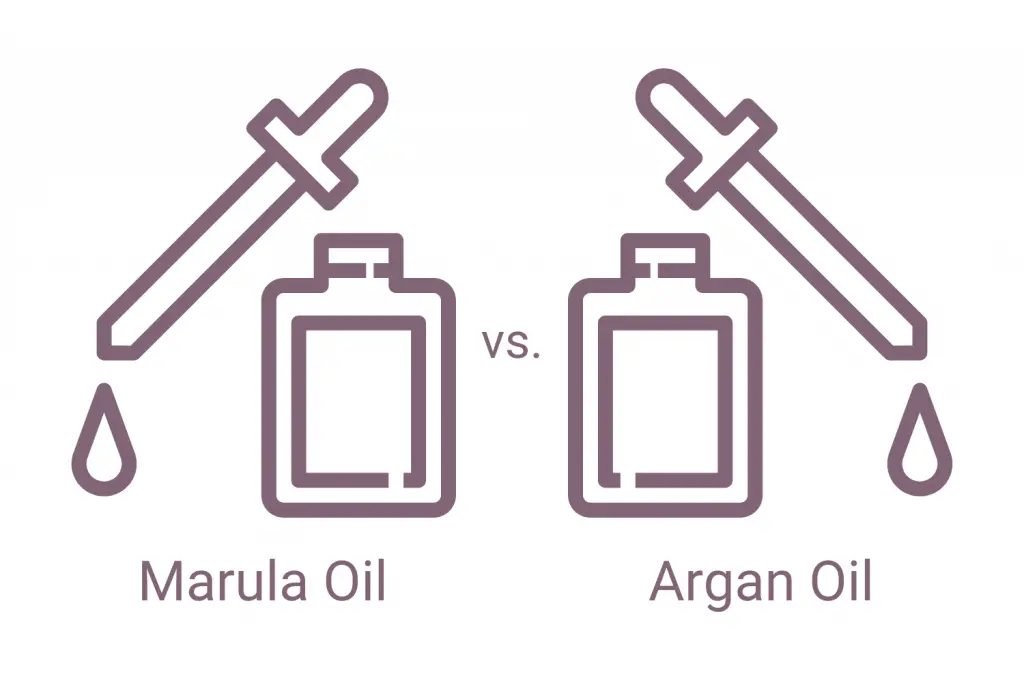Everyone is always on the hunt for the perfect, natural skin care oil. We’re sorta on that hunt too, regardless of how many amazing oils (and products) we try.
This post may contain affiliate links. Read the full disclosure here
Two lovely natural oils are marula and argan. They’re both popular (and mostly loved) oils that can be used on their own in pure-form or as ingredients in more complex skincare product formulations.
But you might be wondering, which one is better? What are the benefits of marula oil vs. argan oil? Are there any concerns to worry about with either of these oils?
We’ll dive into all of the questions above, but first, let’s better understand where each of the oils come from.
What is Marula Oil?

This nourishing oil is made from the nuts of Marula trees (Sclerocarya birrea). There are two types, one that is extracted from the seeds and one extracted using the hard shell of the nut. Marula oil (Sclerocarya Birrea) can be used for cooking but it’s also growing in popularity in skincare and cosmetics. This natural oil is rich in fatty acids and antioxidants, making it an attractive ingredient in skincare products. It’s most commonly sourced from South Africa.
Marula oil offers various benefits to the skin with its nutrient-rich composition.
- Rich in Vitamin C, Vitamin E, and flavonoids that help replenish and protect the skin.
- It’s rich in fatty acids such as oleic acid which deeply hydrate and nourish the skin
- Marula oil penetrates the skin barrier. This helps offer deep hydration but it can also help improve the effectiveness of other skincare ingredients.
Marula oil has a non-greasy texture that is quickly absorbed into the skin. It is sought after for its ability to hydrate, soothe, and soften skin. It also has been widely studied with regard to its antidiabetic, anti-inflammatory, analgesic, antiparasitic, antimicrobial, and antihypertensive activities.
Other Marula oil comparison articles you might like:
What is Argan Oil?

Argan oil (Argania Spinosa kernel oil) is made from the kernel of the Argan tree, which is native to Morocco. It’s commonly referred to as Moroccan oil since it originates from Morocco. But take a closer look if you see a product labeled as “Moroccan oil”. It might be pure argan oil or it might be a blend of argan + other lower-quality oils.
This oil can also be used for cooking, although the process for preparing it is a little different than what is used for cosmetics and skincare. For cooking the kernels within the argan fruits are roasted but they are not for use in skincare.
Argan oil offers the following:
- Rich in fatty acids such as linoleic acids, oleic acid, and palmitic acid to hydrate and nourish the skin.
- Argan oil contains vitamin E which helps the skin retain moisture and helps soothe and heal the skin.
- Squalene hydrates and softens skin to help prevent wrinkles and fine lines.
Argan oil is widely popular in facial oils based on its unique composition and wide range of skin benefits. It contains vitamin E, carotenes, squalene, and fatty acids. This oil is often mixed with other ingredients for facial oils and nourishing creams. But it’s also commonly sold as pure argan oil.
It hydrates skin without leading to excess oiliness, fights free radicals, and offers anti-aging benefits.
More argan oil comparison articles you might like:
How do Marula Oil and Argan Oil Benefits Compare?
Marula oil and argan oil share many of the same skin benefits. They both help with anti-aging, soothe skin, hydrate, are rich in antioxidants, and have anti-inflammatory properties. Argan oil can also help with acne, so that is one additional benefit that sets it apart.
In addition, argan oil has been more widely used and studied in the U.S so there are more studies and results to reference. We’ll start to see more studies with marula oil over the next few years if the popularity of the oil continues.
Marula Oil Skin Benefits
Marula oil offers a wide range of benefits for the skin. It helps fight off fine lines and wrinkles, hydrates, and can help soothe and calm the skin.
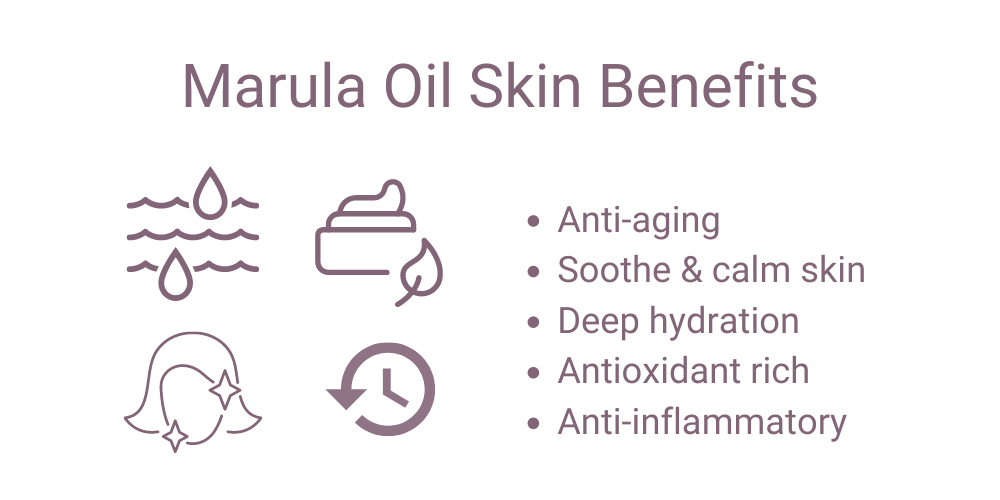
- Anti-aging – One study showed the potential anti-aging benefits of marula oil. However, oil extracted from the stems of the plant was the most effective at protecting elastin and collagen. Although the clinical data may not be there, many turn to this ingredient as an age-defying ingredient based on its composition of fatty acids and antioxidants.
- Soothe and calm skin – Marula oil can smooth and soften dry, tight, and unhappy skin. While there aren’t solid studies showing its ability to help with eczema and psoriasis there is anecdotal evidence that it can help.
- Hydrates Skin – Marula oil is a great option for dry and dehydrated skin. It’s rich in oleic acid, which offers deep hydration to the skin. It can help lock in skin moisture without leaving the skin feeling greasy.
- Antioxidant protection – Marula oil is packed with antioxidants such as vitamin C, vitamin E, and others. These help protect the skin against free radicals caused by the environment or sun damage.
- Anti-inflammatory – Marula oil also has anti-inflammatory properties that may help with redness or skin irritation.
Argan Oil Skin Benefits
But Argan oil also offers similar benefits that include hydration, anti-aging, soothe & calm skin, but it is also favorable for acne-prone skin.
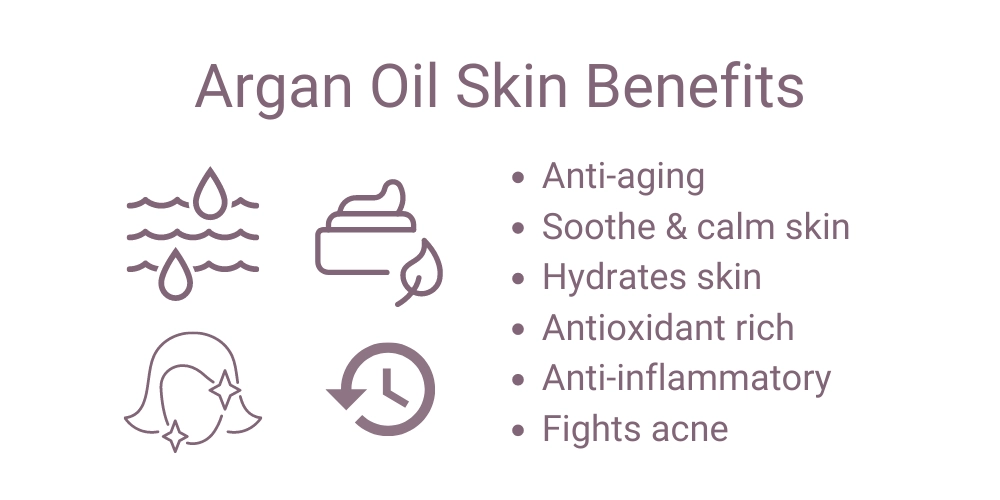
- Anti-aging – Argan oil also offers anti-aging benefits. One study found that both consuming argan oil and applying it topically can increase skin elasticity.
- Soothe and calm skin – Argan oil also nourishes the skin with fatty acids and nutrients to help soothe and calm skin. This oil can help support a healthy skin barrier to help prevent future skin issues.
- Hydrates Skin – Argan oil is also great for skin hydration. It offers a balance of fatty acids such as oleic acid and linoleic acid to replenish skin moisture.
- Antioxidant protection – Argan oil is also rich in antioxidants which include vitamin E and tocopherol which can help protect the skin against damage from free radicals.
- Anti-inflammatory – Argan oil has also been shown to help with inflammation and help repair the skin barrier.
- Fights Acne – Here’s a new one to the list, argan oil can help with acne. While it’s not an FDA approved acne treatment, applying argan oil can help balance sebum production which can help with acne. Here’s the catch though. In some cases argan oil can clog pores, thus leading to acne. So even though it offers sebum balancing benefits, it isn’t always the best option for acne prone skin.
What Are the Differences Between Argan Oil and Marula Oil?
So if the benefits are almost the same you might be wondering, what is the difference? Does it even matter which one you use? They are both amazing natural oils but there are subtle differences of note. Let’s take a deeper look at the composition of argan oil and marula oil to see the differences.
Marula Oil
As you can see from the chart below, marula oil has a very high oleic acid content and lower percentages of other fatty acids such as linoleic acid. The high oleic acid content makes it a great option for replenishing moisture in dry, dehydrated, and aging skin. The fatty acid profile isn’t as balanced as argan oil. Instead, this oil relies on the skin benefits found in oleic acid.
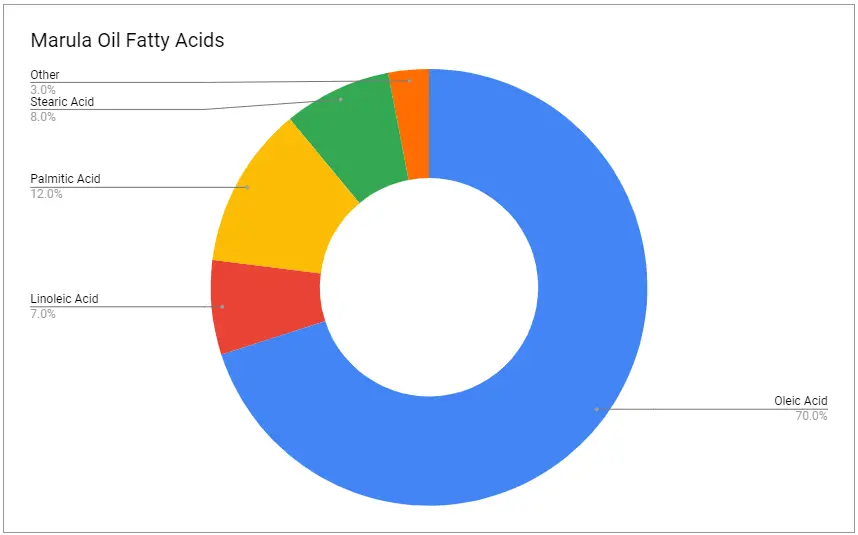
Fatty Acids
- Oleic acid (70-78%)
- Linoleic acid (4-7%)
- Alpha-linolenic acid (0.1-0.7%)
- Palmitic acid (9-12%)
- Stearic acid (5-8%)
- Arachidonic acid (0.3-0.7%)
Antioxidants
- phenolic compounds
- vitamin E
- vitamin C
Argan Oil
As seen in the chart below, argan oil offers a great balance of fatty acids. This is also an oleic acid dominant oil, but it has a much higher linoleic acid content compared to marula oil. The balance of oleic acid and linoleic acid lets you enjoy the benefits of both oleic acid and linoleic acid.
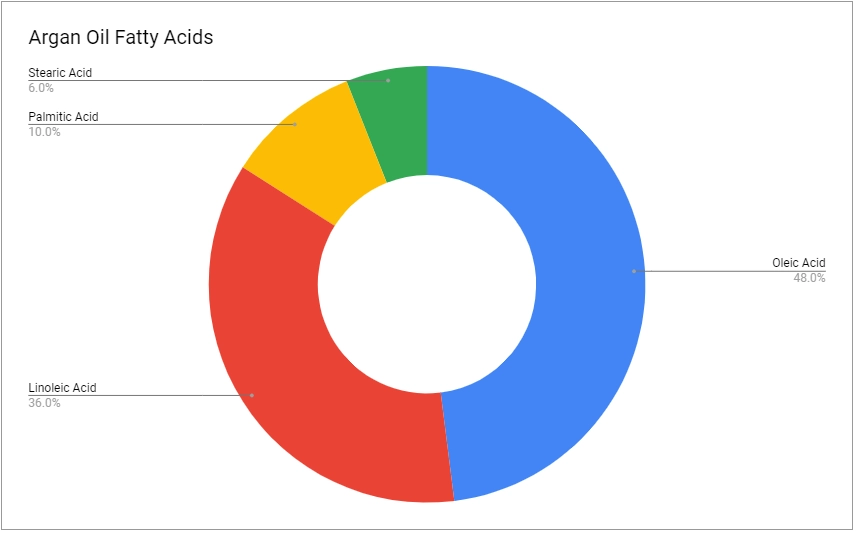
Fatty Acids
- Oleic acid – 42.8%
- Linoleic acid – 36.8%
- Palmitic acid – 12%
- Stearic acid – 6%
- Linolenic acid – <0.5%
Antioxidants
- phenolic compounds
- vitamin E
- vitamin C
Marula Oil vs. Argan Oil Based on Skin Type
When trying to determine whether marula oil or argan oil is best, it’s important to look at a few factors. The first is skin type. If you have dry or combination skin you’ll have different skin needs than normal or oily skin.
Oily or Acne-Prone Skin
If you have oily or acne-prone skin you’ll be better off with argan oil than marula oil. Argan oil has a more balanced fatty acid profile (less oleic acid) which is less likely to lead to excess oiliness and to clog pores.
Marula oil has a comedogenic rating of 3-4, meaning it may clog pores. While this isn’t a concern for dry or balanced skin, it could worsen acne or clogged pores. Oily skin needs hydration too but it’s better to use lighter oils that quickly absorb into the skin and have a lower risk of clogging pores.
Dry, Normal, or Combination Skin
Both oils can work for dry, normal, and combination skin. However, if the skin is very dry or dehydrated marula oil might be a better fit. Since marula oil has a high oleic acid content, it will absorb deep into the skin providing deep, nourishing hydration.
Argan oil is great for dry skin too but it doesn’t offer the deep hydration that marula oil offers. Keep in mind your skin type may change throughout the seasons as well. For instance, argan oil might be a perfect fit for your skin most of the year. However, when winter rolls around you might need something like marula oil for an added boost of hydration.
Which Oil Should I Use?
As you can see from all the information above, both marula oil and argan oil offer a wide range of skin benefits. Most of the core benefits overlap, meaning they aren’t all that different in terms of what they can do for your skin. However, argan oil is favorable if you have oily skin or have issues with acne, clogged pores, or blackheads. If you have super dry skin then marula oil is the best bet.
For everyone in the middle, both oils will likely be a great fit for your skin! The best way to find out is to try them both and see which one works better. We provide all the science-based information and thoughts based on our experiences but your skin is unique! What works for some may not work for others.
Whenever trying out a new product, start with a small area to first see how your skin reacts. Or if you are currently seeing a dermatologist or working with any other health care professional, get their opinion first!
You may also find the following comparison ingredient articles interesting:

